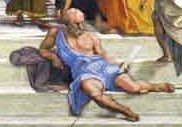Tuesday, April 22, 2008
Thinking about Dan Brown's books...
Angels and Demons has the basic theme of science versus religion/faith. Such a meaning is not hidden at all and is evident as one reads the book. This debate has been one of the cornerstones of Western thinking since the days of the Enlightenment when the very foundations of the Church were shaken by the re-emergence of scientific rationale. While not nearly as controversial as The Da Vinci Code, Brown brings into question the possibility of whether science can explain the creation of existence in logical terms devoid of religion. This is a hot topic for sure and one that all scholarly people should engage in at least once in their lives.
The Da Vinci Code has a message that is a bit less obvious. Many seem to think the theme is the credibility of the Church regarding nearly two millennium's worth of cover-ups, lies, and deceit. While these are elements of the story, the real theme is facts versus beliefs and power of each to effect human thinking. This is a theme that transcends Brown's adventure-type stories and permeates all of human history. Are beliefs so powerful as to block out obvious facts that contradict beliefs? That is was The Da Vinci Code is about - not about a lie perpetuated by a Church, but what facts, of any kind, can do to beliefs when those facts come to light.
After having read The Da Vinci Code, I formulated this basic philosophy, one that I had always known, but for the first time was able to put into words: The Facts are what they are; the Truth is what you make of it.
Tuesday, April 1, 2008
Technology as Religion
I’m reading The Da Vinci Code and it forces me to look back to graduate school when we all sat around and debated religion, faith, and the nature of spirituality. Ah, those were the days! I still ponder these notions today; not doing would besmirch the education and training I received as an historian.
Historically speaking, religion is the oldest form of technology in human existence, created by a social class determined to control the rest, often by means of fear. Now, the same class of people exists, but they exist as the IT Department in your organization. Interesting isn’t it?
Brown raised many interesting points with his books and sparked controversy to this day, especially concerning the possibility that an entire religion is founded on false principles. He asks the reader if it is worth it to expose such frauds for the sake of truth. If at all came crashing down, how would most ill-educated people cope? The same holds to paying homage to our technological deities. When they fail to work, we curse the day they were made, demanding a return to normal function immediately. Did the Israelites not do the same when all when well in the Promised Land and curse God when their expectations were not meet?
I’m supposed to be the Cynical Librarian, and in keeping with a cynical thread, I postulate that the religion of the modern, western world is technology, the priests, the IT people, the church, the Internet, and the prophet, Google itself!! I invite arguments, attacks, and support.